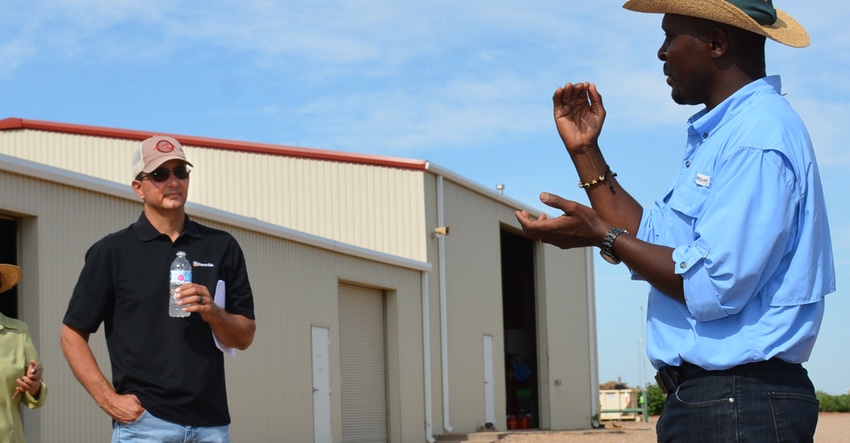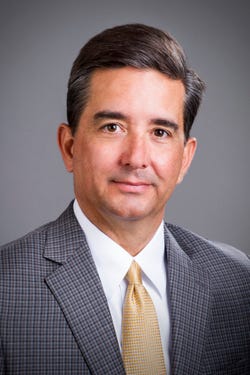June 3, 2020

A regional native and nationally prominent researcher in plant breeding has been hired as the director of the Semi-Arid Agricultural Systems Institute at West Texas A&M University in Canyon.
Craig Bednarz, an Idalou native, began May 1 in a joint appointment by West Texas A&M, Texas A&M AgriLife Research in Amarillo and the Texas A&M University Department of Soil and Crop Sciences.
 (Craig Bednarz, will lead the Semi-Arid Agricultural Systems Institute at West Texas A&M University in Canyon, with join responsibilities to Texas A&M AgriLife Research-Amarillo. Courtesy photo.)
(Craig Bednarz, will lead the Semi-Arid Agricultural Systems Institute at West Texas A&M University in Canyon, with join responsibilities to Texas A&M AgriLife Research-Amarillo. Courtesy photo.)

Bednarz will serve as an associate professor of plant, soil and environmental sciences at West Texas A&M. He will lead and expand the research, instruction and service programs of the institute, addressing issues facing semi-arid agriculture systems in the Texas Panhandle and surrounding area, said Lance Kieth, head of West Texas A&M’s Department of Agricultural Sciences.
He is one of two hires who will work jointly under the Chancellor’s Research Initiative. Bednarz will lead a formal research program in water-resource management, water use in drought tolerance crops, limited-irrigation cropping systems, remote sensing technologies, and intensive cattle grazing systems for Panhandle agriculture and allied industries.
“When I was younger and growing up in this area, we used to irrigate cotton from a ditch,” Bednarz said. “Back then, the well capacity was a lot higher. That’s all changed now. Water availability in the Ogallala Aquifer has been drying up, and that certainly is impacting the quality of life in this area.”
Bednarz, a nationally known researcher in crop physiology for row crop production systems, primarily cotton, said he wants to do whatever he can to ensure future generations can still utilize those water resources
“That’s in line with my scientific interests and, on a personal note, I have a tie to this region and to agriculture in this region, and I want to see it continue to grow and thrive,” he said.
Semi-Arid Agricultural Systems
The Semi-Arid Agricultural Systems Institute, formerly known as the Dryland Agriculture Institute, was led by Bob Stewart, until his retirement in 2017. Its mission is to assist researchers, educators, extension workers and administrators to develop practical and workable strategies for improving the sustainability of dryland agriculture systems worldwide.
“We knew that replacing Dr. Stewart would be a difficult task, so having Dr. Bednarz fill the void left by Dr. Stewart’s retirement has been a win-win for both WT and AgriLife Research,” Kieth said. “Like Dr. Stewart, Dr. Bednarz is a leader, and we expect him not only to lead research efforts, but also to build and lead a team of researchers and educators to tackle agriculture’s utilization of water resources in the Texas Panhandle and surrounding region.”
“I’m delighted to have someone with Craig’s horsepower on board with us,” said Brent Auvermann, center director of AgriLife Research at Amarillo. “He’s a worthy heir to Dr. Stewart’s legacy, and his program is going to fill an important niche in our region’s agricultural research portfolio. Also, Craig’s expertise in cotton is a tremendous bonus as the cotton patch expands northward.”
Bednarz earned a bachelor’s degree in agricultural education and a master’s degree in crop science from Texas Tech University; he earned a doctorate in agronomy from the University of Arkansas. He has previously worked as a cotton breeder in private industry and as a cotton agronomist for Texas Tech, Mississippi State University and the University of Georgia.
Source: is AgriLife TODAY, which is solely responsible for the information provided and is wholly owned by the source. Informa Business Media and all its subsidiaries are not responsible for any of the content contained in this information asset.
Read more about:
DrylandYou May Also Like




